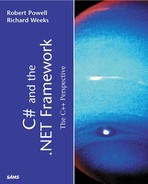Chapter 1.4. Working with Managed Extensions to C++
IN THIS CHAPTER
In the previous chapter we looked briefly at managed extensions to C++ as a way to use your C++ skills, either in the managed environment of .NET or as a vehicle for reusing your existing code. If you're the typical C++ programmer looking at migration to .NET, the questions foremost in your mind will be “Can I protect my investment in all that C++ code?” and “Can I use C++ and C# together easily?” Thankfully, due to the efforts of the Microsoft engineers, both of these questions have positive answers. Let's take a short sidetrip into managed extensions to C++ and get a feel for where your old code can fit into the new world of .NET.
The managed extensions add a few keywords to the C++ language. Obviously this is not going to amuse language lawyers the world over, but remember that in reality, managed C++ is not an attempt to corrupt ANSI specifications but a compromise that allows many of the benefits of the managed runtime without the pain of having to learn a whole new language. As an aside, the Visual Studio.NET C++ compiler is actually more ANSI compliant than its predecessors when used in native C++ mode. When used to compile ordinary C++ code, the compiler generates x86 object code for linking in the normal manner. When used to compile managed C++, the /CLR command-line argument is used, and the compiler creates IL instead.
